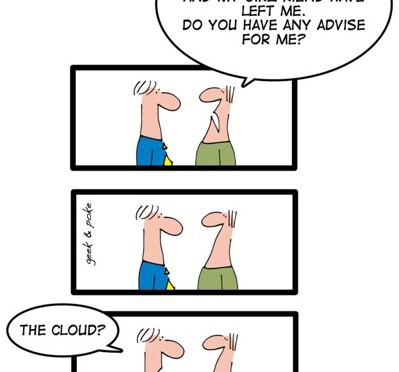
Choosing Cloud computing?
You’d better count the cost before and not after!
We are being approached by at least 3 companies a day that are pushing us to sell their clod facilities to our clients and they say we will get rich out of doing this.
Unlike most companies we are interested in the long term relationship and not the quick kill. We don’t employ and have a high turnover of high commission salesman.
Say “cloud” to anyone at cmx business computing and we all get the same thoughts, “Double glazing, PPI, Endowment mortgages, extended warranties” all get rich quick schemes for the dodgy seller wheeler-dealer spiv salesman”
So by now you think cmx is anti-cloud – WRONG. There are many reasons the cloud can be the right answer but you have to look at the question first. So many cloud consultants are like the cartoon. “The answer is yes, now what’s the question?”
There are many reasons the cloud can be the right answer but you have to look at the question first. So many cloud consultants are like the cartoon. “The answer is yes, now what’s the question?”
Talk about cart and horse. Before you decide to use the cloud you need to know why you haven’t used it before and why you want to use it now.
Lets do the consultancy bit first and ask questions. That’s what a consultant does.
What is the cloud? Really!
Do you have good fantastic broadband No? – forget it
Are you replacing a server and frightened by the cost?
Are you trying to save money?
Do you want Data Backup
Do you want to share data
Do you have a cashflow restriction?
The downside
Conclusion
What is the cloud? Really!
The cloud is storage or programs that you access using the Internet. The trouble is the company supplying the Cloud service could be as big as Apple or Microsoft or as small as Phoenix – who are they you ask? 10 years ago my son had some friends, they borrowed a garage from one of their number, set up a server, setup a company and offered on-line storage. They were ahead of their time and the problem? They were sixteen and the dad wanted his garage back after six months so they closed it all down. They did it ethically but how do you know if your cloud storage company isn’t small and in a mates garage – You don’t, unless its a big company
Do you have good fantastic broadband No? – forget it
If the answer is no then don’t even think about it. Broadband comes in two flavours, what you get down to your site and what you send up. The up is always faster than the down unless you have a balanced service which to most people is unaffordable. The reason is quite simple what you send up is simple, like asking Google about ” who is the Queen” what you get back is millions of characters of information called search results, you press one click on an entry and you get a whole lot more. Up does not usually need to be fast.
When you use the cloud for email, data or anything the UP has to be at least a useful speed. Anything slow is useless and lets face it most of North Essex and Suffolk is slow on broadband, so forget the cloud.
To see how fast your broadband is go to speedtest.com.
Are you replacing a server and frightened by the cost?
Several years ago Microsoft had a low cost server package for small business. This had everything and by the time it was installed the cost of the server was between £2k and £8K. Microsoft have removed this and replaced it with the full package which costs £8k to £15k. Big companies will pay this as it hasn’t changed for them but small companies cant afford it. So they are offered the cloud. We can supply a Server for small business with Exchange like email for £2k-£8k but not everyone can, so you can keep it in house.
Are you trying to save money?
If you go to the cloud you won’t, it will cost you three times as much. Microsoft make their money by pushing you on to the cloud. If you buy Microsoft Office on a PC you will pay around £200. Most people keep a computer for five years, we have some running and 11 year old version of office. If you go on the cloud, that will cost you £10 a month, over five years that’s £600. Five users = £3,000. See the plan? Save yourself and buy a replacement server and we can supply one with an email system that’s a fraction of the cost, by avoiding Exchange.
Do you want Data Backup
If you are a sensible one man band you will want data backed up somewhere else apart from your place of work. If your backup is within 100 metres of your system, you don’t really have a backup.
So the cloud, send it up overnight, job done, It will cost you a lot and it will be single generation, for more information on what this means ask us. If your broadband is slow the initial backup will be slow. The questions to ask your self is who owns the data and how safe is it? 12p/Gb/month at Rackspace. That’s £216 = VAT a year for the average 150Gb data storage of most companies or over £1,000 for five years.
It’s the ideal answer for a small single premises business, but a better answer is Macrium, its free, and a small GOOD QUALITY USB disk unit for £100, make a full backup once a month / week make a full backup and take it to your mothers, a friend, a relative anyone that you don’t mind seeing once a week. I had a client who gave it to their cleaner, she was 60 and it was secure.
Do you want to share data
This is the best reason for the cloud, collaborative sharing for small companies. Things like email, diaries, forms, photos data. Well I have news for you. If you are a big company then do it yourself. If you are small then use the cloud but use the free services that are available. Use ActiveSync with your Google mail, iPhone or iPad.
Do you have a cashflow restriction?The biggest reason for using the cloud is spreading the cost. You wouldn’t go to a loan shark to borrow money so why not lease the equipment? It spreads the cost over five years and is a low fixed amount, usually around 6%. The best news is that you can claim this 100% against tax. So you get maximum tax efficiency, spread the cost and save money by buying your own server.
The downside of the cloud. Apart from the cost which is a big consideration what about reliability and there is a big debate about who owns your data. If you use online CRM there is no export facility so you cannot move onto something like ACT! without re-entering the data.
Apart from the cost which is a big consideration what about reliability and there is a big debate about who owns your data. If you use online CRM there is no export facility so you cannot move onto something like ACT! without re-entering the data.
What happens if there is a fire on a local exchange or in the datacentre. If they are a big concern then your data will be replicated elsewhere. But even the big guys have problems. This is a Telstra Exchange and data facility which was down for months and affected 65,000 subscribers. The cost was in the tens of millions in lost business and now the lawyers are involved it will be sorted out eventually but what happens in the meantime?
So if you live in a big city, have fast broadband, need to share your data and have plenty of money then the cloud is maybe a good idea. However if you have 2Mb broadband, 150Gb of data five exchange email accounts and use Sage and ACT! then forget it and I think that’s most of the SME’s in North Essex and Suffolk. We can advices who to go with and we can be independent because we don’t make a penny setting the cloud up for you like those wonderful knowledgeable pressure sellers I talked about earlier.













